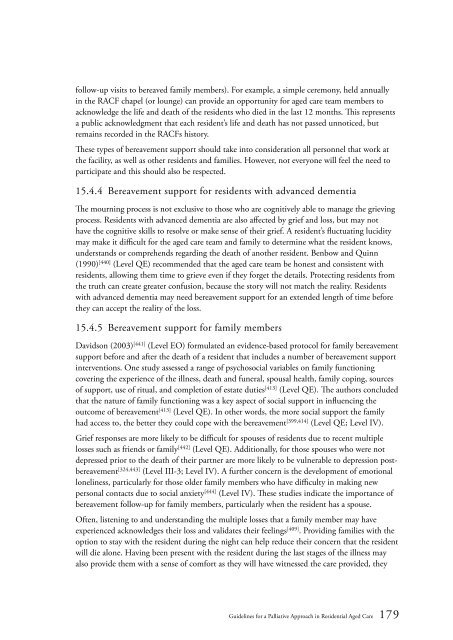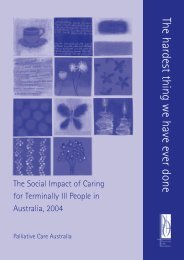Guidelines for a Palliative Approach in Residential Aged Care
Guidelines for a Palliative Approach in Residential Aged Care
Guidelines for a Palliative Approach in Residential Aged Care
Create successful ePaper yourself
Turn your PDF publications into a flip-book with our unique Google optimized e-Paper software.
follow-up visits to bereaved family members). For example, a simple ceremony, held annually<br />
<strong>in</strong> the RACF chapel (or lounge) can provide an opportunity <strong>for</strong> aged care team members to<br />
acknowledge the life and death of the residents who died <strong>in</strong> the last 12 months. This represents<br />
a public acknowledgment that each resident’s life and death has not passed unnoticed, but<br />
rema<strong>in</strong>s recorded <strong>in</strong> the RACFs history.<br />
These types of bereavement support should take <strong>in</strong>to consideration all personnel that work at<br />
the facility, as well as other residents and families. However, not everyone will feel the need to<br />
participate and this should also be respected.<br />
15.4.4 Bereavement support <strong>for</strong> residents with advanced dementia<br />
The mourn<strong>in</strong>g process is not exclusive to those who are cognitively able to manage the griev<strong>in</strong>g<br />
process. Residents with advanced dementia are also affected by grief and loss, but may not<br />
have the cognitive skills to resolve or make sense of their grief. A resident’s fluctuat<strong>in</strong>g lucidity<br />
may make it difficult <strong>for</strong> the aged care team and family to determ<strong>in</strong>e what the resident knows,<br />
understands or comprehends regard<strong>in</strong>g the death of another resident. Benbow and Qu<strong>in</strong>n<br />
(1990) [440] (Level QE) recommended that the aged care team be honest and consistent with<br />
residents, allow<strong>in</strong>g them time to grieve even if they <strong>for</strong>get the details. Protect<strong>in</strong>g residents from<br />
the truth can create greater confusion, because the story will not match the reality. Residents<br />
with advanced dementia may need bereavement support <strong>for</strong> an extended length of time be<strong>for</strong>e<br />
they can accept the reality of the loss.<br />
15.4.5 Bereavement support <strong>for</strong> family members<br />
Davidson (2003) [441] (Level EO) <strong>for</strong>mulated an evidence-based protocol <strong>for</strong> family bereavement<br />
support be<strong>for</strong>e and after the death of a resident that <strong>in</strong>cludes a number of bereavement support<br />
<strong>in</strong>terventions. One study assessed a range of psychosocial variables on family function<strong>in</strong>g<br />
cover<strong>in</strong>g the experience of the illness, death and funeral, spousal health, family cop<strong>in</strong>g, sources<br />
of support, use of ritual, and completion of estate duties [413] (Level QE). The authors concluded<br />
that the nature of family function<strong>in</strong>g was a key aspect of social support <strong>in</strong> <strong>in</strong>fluenc<strong>in</strong>g the<br />
outcome of bereavement [413] (Level QE). In other words, the more social support the family<br />
had access to, the better they could cope with the bereavement [399,414] (Level QE; Level IV).<br />
Grief responses are more likely to be difficult <strong>for</strong> spouses of residents due to recent multiple<br />
losses such as friends or family [442] (Level QE). Additionally, <strong>for</strong> those spouses who were not<br />
depressed prior to the death of their partner are more likely to be vulnerable to depression postbereavement<br />
[324,443] (Level III-3; Level IV). A further concern is the development of emotional<br />
lonel<strong>in</strong>ess, particularly <strong>for</strong> those older family members who have difficulty <strong>in</strong> mak<strong>in</strong>g new<br />
personal contacts due to social anxiety [444] (Level IV). These studies <strong>in</strong>dicate the importance of<br />
bereavement follow-up <strong>for</strong> family members, particularly when the resident has a spouse.<br />
Often, listen<strong>in</strong>g to and understand<strong>in</strong>g the multiple losses that a family member may have<br />
experienced acknowledges their loss and validates their feel<strong>in</strong>gs [409] . Provid<strong>in</strong>g families with the<br />
option to stay with the resident dur<strong>in</strong>g the night can help reduce their concern that the resident<br />
will die alone. Hav<strong>in</strong>g been present with the resident dur<strong>in</strong>g the last stages of the illness may<br />
also provide them with a sense of com<strong>for</strong>t as they will have witnessed the care provided, they<br />
<strong>Guidel<strong>in</strong>es</strong> <strong>for</strong> a <strong>Palliative</strong> <strong>Approach</strong> <strong>in</strong> <strong>Residential</strong> <strong>Aged</strong> <strong>Care</strong> 179
















